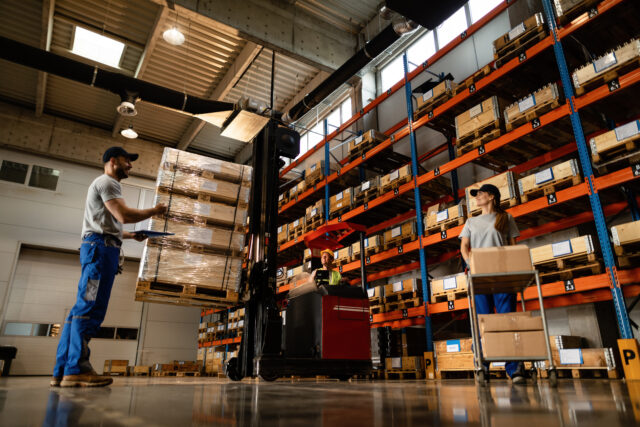The new technologies emerging in the market day by day are shaping a scenario of increasingly rapid and constant change. Information and communication technologies have enabled greater speed and automation of processes that were previously unimaginable.
An example of this wave of transformations is the introduction of these new technologies into industrial processes and the production chain, also known as Industry 4.0. Innovations such as cloud computing, data collection and processing, and artificial intelligence have been used to optimize the flow of operations in the supply chain. The latter, particularly, has brought significant changes in terms of demand forecasting.
The use of software and other artificial intelligence-based tools can provide a competitive advantage for those who adopt them correctly.
Currently, artificial intelligence proves to be an indispensable tool to support industry tools and operations, ensuring greater integration in the operations of the production chain agents. However, there is still much confusion regarding the terminology and how it can be advantageous for the agents of the production chain.
Interested in learning more about artificial intelligence and how it helps industry build more fluid work dynamics with its partners and channels? Then follow us in the content below to discover everything about this advent that is transforming production chains.
What is artificial intelligence?
So what exactly is artificial intelligence and how does it differ from a typical automated process?
First and foremost, it's important to understand the process of human intelligence, as artificial intelligence is based on it.
A human brain is capable of performing and prioritizing tasks of varying levels of complexity. Its autonomy allows for judgment in various situations encountered in daily life.
Through the evolution of the human species, the human mind has developed the ability to make diverse associations based on factors like cognition and subjectivity, resulting in what we call intelligence.
It is intelligence that enables us to perceive and interpret the world around us according to what is intelligible to us.
But what does artificial intelligence have to do with this? Well, artificial intelligence emerges as a way to simulate this intelligence. By delegating the capacity for judgment and analysis to computers, it reduces the burden of these simple tasks on humans.
At present, technologies based on artificial intelligence do not possess the same processing and judgment capabilities as the human mind.
However, artificial intelligence already enables the completion of many tasks, such as various smartphone applications, virtual assistants, and other technological tools we use daily.
In the case of artificial intelligence, the capacity for judgment and decision-making occurs through commands constructed via a programming process known as algorithms.
Algorithms are responsible for the guidelines that define the focus of artificial intelligences' actions, which explains their deployment in various sectors, such as industry.
Artificial Intelligence and Industry Operations
For today's companies, artificial intelligence emerges as a facilitator of automated processes, providing greater credibility and reliability to these operations.
Through well-constructed programming and algorithms, artificial intelligence can be present in various stages of a product's lifecycle, from manufacturing to post-sale data implications (sell-out).
For stakeholders in the production chain, this means greater versatility in their operations and the ability to build customizable tools tailored to their specific needs.
By obtaining processed data ready for interpretation, industry managers can predict demands well in advance and determine the best actions for current and future operations.
Because of these reasons, artificial intelligence is increasingly pervasive not only in industrial processes but also in integration tools that enhance synergy between industry activities and their partner channels.
This aids in building stronger and more structured partnerships, as channel integration is the latest trend in today's market.
An artificial intelligence-based tool can provide managers with greater visibility into processes and their direct and indirect consequences, enabling management to focus more on decision-making based on insights, thereby streamlining processes that would otherwise require more time and resources.
It's no wonder that companies across diverse sectors and business models are leveraging artificial intelligence as a foundation for their operations. Today, artificial intelligence is seen in fields such as education, healthcare, transportation, among others.
Considering all these aspects of artificial intelligence, the current market trend is integration among stakeholders and operations, all aimed at delivering high-value products efficiently to consumers.
Implanta's Solutions and Process Visibility
As artificial intelligence optimizes various processes for industries, it's crucial to consider how these tools meet the specific needs of each sector within the production chain.
Beyond addressing specific needs, managers must evaluate how effectively these tools meet those needs and assess the quality of their implementation.
Recognizing this, industries can adopt integration software that provides greater visibility into the product lifecycle. This strategic approach enhances production management, integrating it more closely with partners and other supply chain agents.
To guarantee this, Implanta provides solutions in artificial intelligence specifically tailored for the industry and forecasts product demand months in advance.
Implanta's solutions guarantee data accuracy of 99.8%, updated in real-time to expedite decision-making with precision and confidence in industrial operations.
The Demand Forecast solution employs artificial intelligence powered by neural network algorithms, which consider a wide range of variables—from consumer buying behavior to inventory numbers.
This approach enables competitive management decisions that are more precise and beneficial for both the industry and its supply chain partners, ultimately delivering enhanced value to end consumers.
To explore more about artificial intelligence tools that can transform your industry's operations, discover Implanta's solutions today. Connect with one of their specialists to make data intelligence the cornerstone of your operations.






